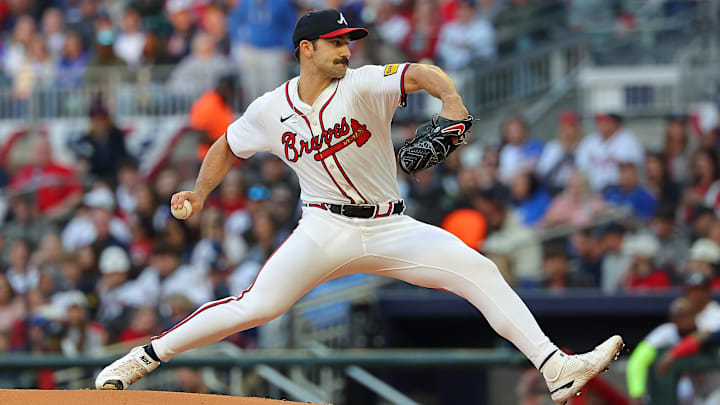Major League Baseball has a pitcher injury epidemic, but no one seems to agree on what's causing it.
The Atlanta Braves announced that right-hander Spencer Strider underwent an MRI that revealed damage to the ulnar collateral ligament (UCL) in his right elbow. The Cleveland Guardians announced Shane Bieber's 2024 season is also over, as he will undergo Tommy John surgery in the coming days. Strider and Bieber join a rapidly growing list of pitchers to suffered season-ending injuries.
Eury Pérez, a 20-year-old starter for the Miami Marlins, is also set to undergo Tommy John surgery.
MLBPA blames pitch clock for pitcher injuries, MLB responds
The Major League Baseball Players Association pointed the finger at the MLB's sweeping rule changes that went into effect during the 2023 season, particularly the shortened pitch clock. MLBPA executive director Tony Clark released a statement regarding pitcher injuries on Saturday, April 6.
"Despite unanimous player opposition and significant concerns regarding health and safety, the commissioner’s office reduced the length of the pitch clock last December, just one season removed from imposing the most significant rule change in decades,” Clark said in the statement. "Since then, our concerns about the health impacts of reduced recovery time have only intensified. The league’s unwillingness thus far to acknowledge or study the effects of these profound changes is an unprecedented threat to our game and its most valuable asset — the players."
The MLB shortened the pitch clock last year in an effort to speed up the game and make it more enjoyable for the casual viewer. The pitch clock gave pitchers 15 seconds to throw with no base runners and 20 seconds with someone on base. In December, the league's competition committee shortened the pitch clock with runners on base to 18 seconds. The rule was proposed after the average time of a nine-inning game grew by more than seven minutes between April and September last year.
The MLB released a rebuttal shortly after Clark's statement.
“This statement ignores the empirical evidence and much more significant long-term trend, over multiple decades, of velocity and spin increases that are highly correlated with arm injuries," MLB said in their statement. "Nobody wants to see pitchers get hurt in this game, which is why MLB is currently undergoing a significant comprehensive research study into the causes of this long-term increase, interviewing prominent medical experts across baseball which to date has been consistent with an independent analysis by Johns Hopkins University that found no evidence to support that the introduction of the pitch clock has increased injuries. In fact, JHU found no evidence that pitchers who worked quickly in 2023 were more likely to sustain an injury than those who worked less quickly on average. JHU also found no evidence that pitchers who sped up their pace were more likely to sustain an injury than those who did not.”
Injuries, six-man rotations, and diminishing workloads are continuing a trend that has decreased the glitz and glamour of the position. The art of pitching is being lost as clubs opt for velocity and spin rate instead of finesse and sophistication. Teams are transitioning from starting pitchers to a large inventory of hard throwers from the bullpen.
The average four-seam velocity increased from 93.8 mph in 2022 to 94.0 mph in June 2023, per MLB.com. The average breaking ball velocity has increased slightly from 82.6 mph to 83.0 mph during that span.
“Well, they’re throwing harder than ever and spinning the ball more than ever,” Braves manager Brian Snitker said on Saturday, h/t The Athletic. “I don’t know. I hate it for everybody concerned. That’s the biggest thing we have in our game, man, is the pitching.”
The pitch clock alone cannot be held responsible for the dramatic increase in pitcher injuries, since they were on the rise long before the rule change was implemented. Just a few years ago, abbreviated spring training during COVID-19 was being held responsible for the rise in injuries.
The truth likely relies somewhere in the middle. The abbreviated recovery time between pitches likely doesn't help the injury rate, but nonstop fastballs probably aren't good for elbow health either.
